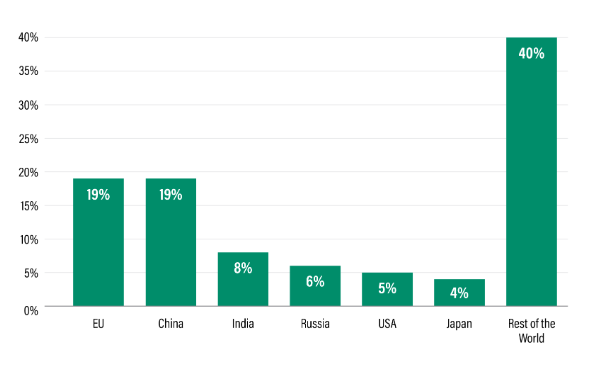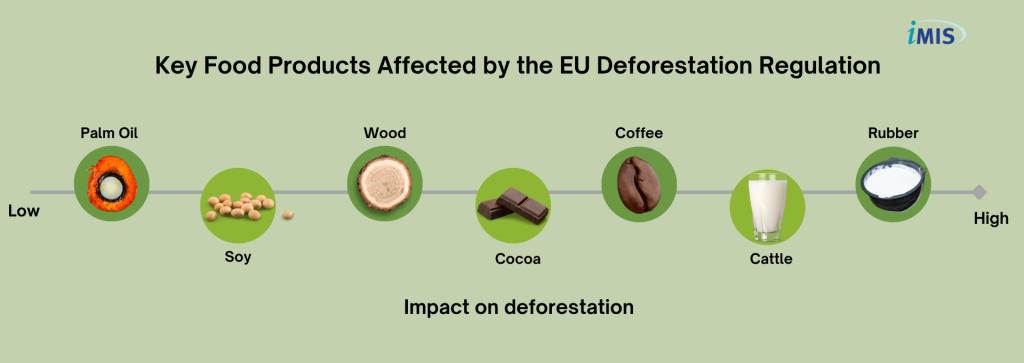Introduction
The European Union is taking a stand against global deforestation with the introduction of the Regulation (EU) 2023/1115 on deforestation-free products, more commonly known as the EU Deforestation Regulation (EUDR). This landmark legislation, published in May 2023, seeks to ensure that European consumption is not contributing to deforestation.
The EUDR holds businesses accountable for ensuring their supply chains are deforestation-free. This has significant implications for the food industry and beyond, impacting sourcing practices, promoting transparency, and contributing to a more sustainable future. This article will explore the key aspects of the EUDR, delving into its potential impact, the challenges of implementation, and the crucial role of consumers and businesses in ensuring its success.
Why the EU is Taking Action Against Deforestation
Deforestation is causing a global crisis with devastating consequences: it fuels climate change, destroys biodiversity, and threatens life. Recognizing its significant contribution to global deforestation (Fig.1) through its consumption of commodities like soy, palm oil, and cocoa, the EU is taking action with the Deforestation Regulation (EUDR).
The EU’s landmark Deforestation Regulation aims to eliminate deforestation linked to products sold within its borders. This means companies must prove their supply chains are sustainable, or risk losing access to the EU market. Without this law, EU demand could fuel the deforestation of nearly 250,000 hectares annually by 2030.

The EUDR aims to:
Breaking the link between consumption and deforestation: The goal is to prevent European markets from driving deforestation by ensuring that imported products like soy, beef, and palm oil are not produced on land cleared of forests.
Reducing the EU’s carbon footprint: By tackling deforestation associated with agricultural production, the EU aims to significantly reduce carbon emissions related to the consumption and production of these commodities.
Comprehensive approach to forest protection: The initiative addresses both deforestation caused by agricultural expansion for the production of targeted commodities and forest degradation, ensuring a holistic approach to forest protection.
Understanding the EUDR: A Closer Look at the Requirements
The EU Deforestation Regulation (EUDR) marks a significant step in the fight against global deforestation. But what exactly does this legislation entail, and how will it impact businesses and consumers? This chapter provides a detailed overview of the EUDR’s key provisions and requirements.
The Scope of the EUDR: Which Products are Affected?
The EUDR establishes a fundamental principle: products linked to deforestation and forest degradation are strictly prohibited from entering the EU market.
Central to this regulation is a clear definition of “deforestation-free.” To qualify, products must originate from land where no deforestation or forest degradation has occurred after December 31, 2020.
This ban encompasses a wide range of commodities, including soy, beef, palm oil, wood, cocoa, coffee, and rubber (Fig. 2).

Mandatory Due Diligence
The EUDR places the responsibility on companies to ensure their products meet these stringent requirements. Therefore, any operator or trader who places these commodities on the EU market, or exports them from it, must conduct mandatory due diligence. This involves:
- Traceability: Companies must be able to trace their supply chains back to the source to verify the origin of their products
- Risk assessment: Companies must assess and mitigate any deforestation risks associated with their products
- Information gathering: All relevant information must be gathered about the land where the commodities were produced
- Compliance documentation: Companies must document and be able to prove the deforestation-free origin of their products
Ensuring Legal and Sustainable Production
To ensure products sold in the EU are truly sustainable, the EUDR goes beyond simply prohibiting deforestation. It demands that production processes align with the legal framework of the producing country, encompassing various aspects:
- Land use, labour, third parties and human rights
- Environmental protection
- Forest-related rules
- The principle of free, prior, and informed consent (FPIC)
- Tax, anti-corruption, trade, and customs regulations
Key Deadlines for EUDR Compliance
To ensure a smooth transition and avoid potential penalties, businesses need to be aware of the deadlines for compliance. Initially, the original deadline for companies to comply with the EUDR was December 30, 2024. However, due to concerns raised by various stakeholders about their preparedness, the European Commission proposed a 12-month postponement.
Therefore, if this proposal is approved by the European Parliament and the Council, the new deadlines will be:
- December 30, 2025: for large companies
- June 30, 2026: for micro- and small enterprises (SMEs)
The Path Forward
The EU Deforestation Regulation (EUDR) presents a complex landscape of challenges and opportunities. Successfully navigating this new terrain requires a delicate balance between ambition and effective implementation. While the EUDR’s comprehensive approach holds the potential to drive significant positive change, addressing the complexities of global supply chains, diverse legal frameworks, and the potential exclusion of smallholder farmers will be crucial.
By fostering collaboration, investing in traceability systems, and supporting sustainable production practices, stakeholders can unlock the EUDR’s full potential, creating a more sustainable and equitable future for both people and the planet.
How iMIS Food Can Help
Navigating the complexities of the EUDR can be a daunting task for businesses in the food industry. Fortunately, tools and technologies are available to help streamline the process and ensure compliance. One such solution is iMIS Food, a comprehensive software platform designed to empower food companies.
Sources
- Carboncloud. (2024, July 19). A Guide to EU Deforestation Regulation (EUDR). CarbonCloud. https://carboncloud.com/blog/eu-deforestation-regulation-eudr/
- Environment policy: general principles and basic framework | Fact Sheets on the European Union | European Parliament. (n.d.). https://www.europarl.europa.eu/factsheets/en/sheet/71/environment-policy-general-principles-and-basic-framework#:~:text=These%20advancements%20strengthened%20the%20EU’s,such%20as%20the%20European%20Green
- European Council. (2024). EU deforestation law: Council agrees to extend application timeline.
- Forest Governance and Policy. (2022). How a new EU regulation can reduce deforestation globally | FGP. FGP. https://forestpolicy.org/article/how-new-eu-regulation-can-reduce-deforestation-globally
- Global Traceability (2024, May 24). EUDR Compliance Guide. Global Traceability. https://www.global-traceability.com/en/eudr/
- Regulation on Deforestation-free products. (n.d.). Environment. https://environment.ec.europa.eu/topics/forests/deforestation/regulation-deforestation-free-products_en
Related articles to The EU Deforestation Regulation (EUDR): A New Era for Sustainable Food
Many customers and visitors to this page 'The EU Deforestation Regulation (EUDR): A New Era for Sustainable Food ' also viewed the articles and manuals listed below:
